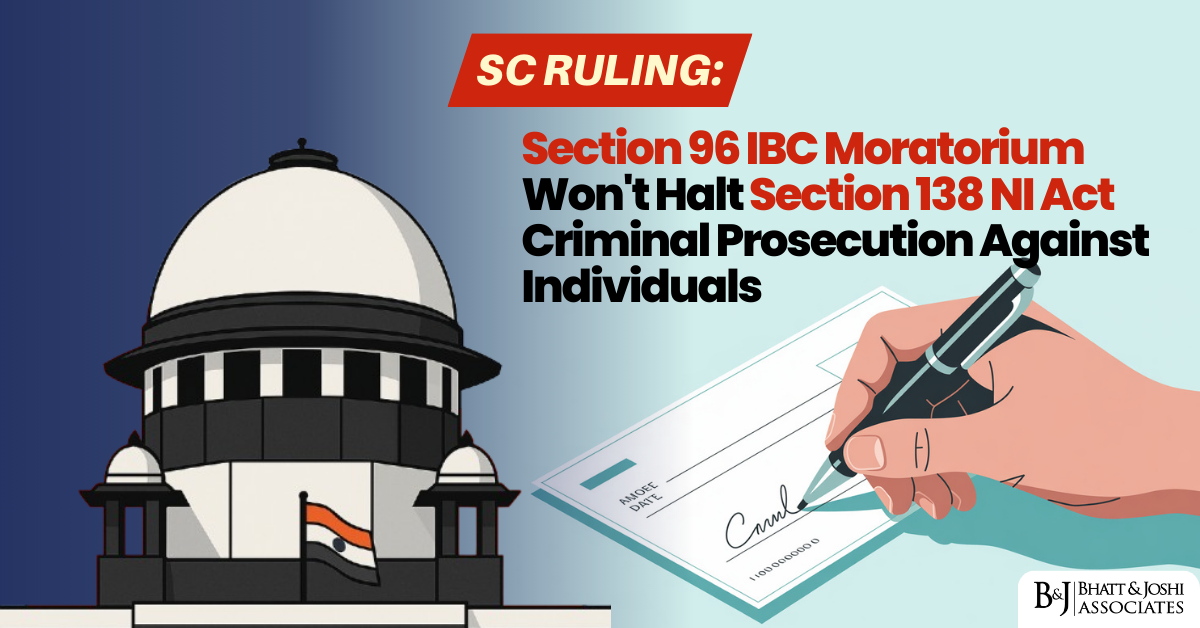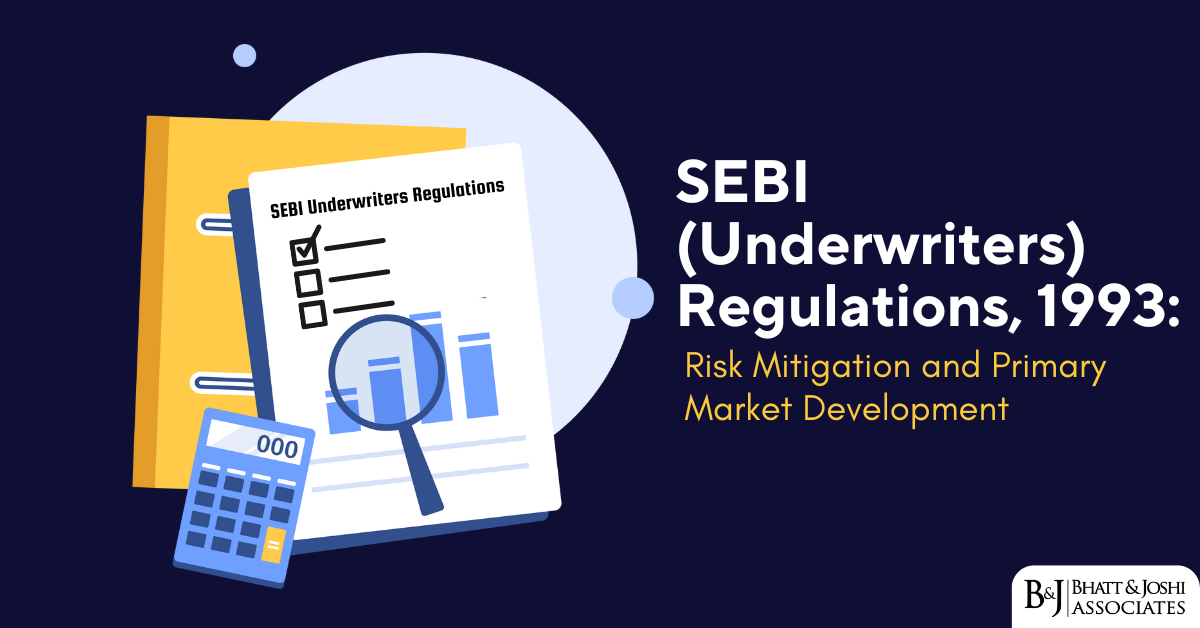Authored by: Aaditya Bhatt, Advocate
Bhatt & Joshi Associates
Introduction
In a significant ruling impacting individuals facing cheque dishonour cases while simultaneously undergoing personal insolvency proceedings, the Supreme Court of India has clarified the scope of the interim moratorium under Section 96 of the Insolvency and Bankruptcy Code, 2016 (IBC). In its judgment dated April 1, 2025, primarily addressing appeals like Rakesh Bhanot vs. M/S.Gurdas Agro Pvt. Ltd. (arising out of SLP (Crl.) No. 6087 of 2023), the Court held that this moratorium does not shield individuals (such as personal guarantors or directors) from criminal prosecution under Section 138 of the Negotiable Instruments Act, 1881 (NI Act).
This common judgment addresses a crucial conflict between the protective measures of the IBC and the punitive provisions of the NI Act concerning personal liability.
Background: Personal Insolvency vs. Cheque Dishonour Prosecution
The cases involved appellants/petitioners facing criminal trials under Section 138 read with Section 141 of the NI Act for cheque dishonour. These individuals, often directors or personal guarantors, had subsequently initiated personal insolvency resolution processes by filing applications under Section 94 of the IBC.
Filing a Section 94 application triggers an automatic interim moratorium under Section 96 IBC. This provision stays pending legal actions and prohibits new ones “in respect of any debt”. The appellants argued their Section 138 NI Act proceedings fell under this stay. Their requests were denied by lower courts, leading to the Supreme Court appeals.
Key Legal Issue: Can Section 96 IBC Moratorium Stay Section 138 NI Act Proceedings?
The Supreme Court identified the central issue in paragraph 4 of the judgment:
- The common legal question that arises for consideration herein is, whether the proceedings initiated against the appellants / petitioners under Section 138 read with Section 141 of the N.I. Act, 1881 should be stayed in view of the interim moratorium under Section 96 IBC having come into effect upon the appellants / petitioners’ filing applications under Section 94 IBC.
Supreme Court’s Analysis and Reasoning
The Court undertook a detailed analysis, emphasizing the distinct nature of Section 138 NI Act proceedings compared to civil debt recovery actions.
Nature of Section 138 Proceedings:
The Court highlighted that NI Act proceedings target the act of dishonour, not just the debt itself. Paragraph 29 states:
- … The protection is not available against penal actions, the object of which is to not recover any debt. This moratorium serves as a critical mechanism, allowing the debtor to reorganize their financial affairs without the immediate threat of creditor actions. The clear and unequivocal language of this provision reflects the legislative intent to provide a protective shield for debtors during the insolvency process.
13. On the other hand, the proceedings under Section 138 of the N.I. Act, 1881, pertain to the dishonor of cheques issued by the respective appellants / petitioners in their personal capacity. These proceedings are distinct from the corporate insolvency proceedings and are aimed at upholding the integrity of commercial transactions by holding individuals accountable for their personal actions…
Interpreting the Scope of Section 96 Moratorium:
The Court focused on the limiting phrase “in respect of any debt” within Section 96. Paragraph 28 clarifies this interpretation:
- … Upon filing of the application under section 94 [IBC], a moratorium comes into effect, designed to protect the debtors from any legal actions concerning their debts. Specifically, Section 96 IBC provides that any legal proceedings pending against the debtor concerning any debt shall be deemed to have been stayed. The term “any legal action or proceedings” does not mean “every legal action or proceedings”. In sub-clauses 96 (b) (i) and (ii), the term “legal action or proceedings” are followed by the term “in respect of any debt”. The term “legal action or proceedings” would have to be understood to include such legal action or proceedings relating to recovery of debt by invoking the principles of noscitur a sociius. The purpose of interim moratorium contemplated under Section 96 is to be derived from the object of the act, which is not to stall the proceedings unrelated to the recovery of the debt.
Further, paragraph 10.1 distinguishes the objective:
10.1. … The use of the words “all the debts” and “in respect of any debt” in Sub-section (1) of Section 96 is not without a purpose, as the moratorium is intended to offer protection only against civil claim to recover the debt. Hence, such period of moratorium prescribed under Section 14 or 96 is restricted in its applicability only to protection against civil claims which are directed towards recovery and not from criminal action.
Liability of Natural Persons (Directors/Guarantors):
The Court heavily relied on its previous rulings in P. Mohanraj v. Shah Brothers Ispat Pvt. Ltd. and Ajay Kumar Radheyshyam Goenka v. Tourism Finance Corporation of India Ltd., which established that even under a Section 14 IBC moratorium (for corporate insolvency), the criminal liability of individuals under Section 141 NI Act continues. The Court extended this principle to the Section 96 scenario.
Quoting its conclusion in P. Mohanraj, the Court stated in paragraph 31:
- … This being the case, it is clear that the moratorium provision contained in Section 14 of the IBC would apply only to the corporate debtor, the natural persons mentioned in Section 141 continuing to be statutorily liable under Chapter XVII of the Negotiable Instruments Act.”
The Court also cited the Ajay Kumar Radheyshyam Goenka judgment in paragraph 16, quoting paragraph 75 from that decision:
- … quoting para 75: “Thus, where the proceedings under Section 138 of the NI Act had already commenced and during the pendency the plan is approved or the company gets dissolved, the Directors and the other accused cannot escape from their liability by citing its dissolution. What is dissolved is only the company, not the personal penal liability of the accused covered under Section 141 of the NI Act. They will have to continue to face the prosecution…”
Final Determination on Stay Application:
Based on this reasoning, the Court concluded that the moratorium under Section 96 IBC cannot be used to halt criminal prosecution under the NI Act. Paragraph 17 states the opinion:
- For the foregoing discussion, we are of the opinion that the object of moratorium or for that purpose, the provision enabling the debtor to approach the Tribunal under Section 94 is not to stall the criminal prosecution, but to only postpone any civil actions to recover any debt. The deterrent effect of Section 138 is critical to maintain the trust in the use of negotiable instruments like cheques in business dealings. Criminal liability for dishonoring cheques ensures that individuals who engage in commercial transactions are held accountable for their actions…
Paragraph 19 delivers the final verdict:
- For the foregoing discussion, the prayer of the appellants / petitioners to stay the prosecution under Section 138 of the N.I. Act, 1881, relying on the interim moratorium under Section 96 IBC, cannot be entertained. Therefore, the judgments / orders passed by the different High Courts affirming the orders of the trial court, which had rightly refused to stay the section 138 proceedings, need not be interfered with by us.
Key Takeaways: Section 96 IBC Moratorium vs. Section 138 NI Act Liability
- Section 138 NI Act Prosecution Continues: Individuals facing cheque dishonour charges cannot halt these criminal proceedings using the Section 96 IBC interim moratorium triggered by their personal insolvency application.
- Moratorium Limited to Civil Debt Recovery: The Section 96 moratorium stays legal actions specifically aimed at recovering debt, not penal actions like Section 138 NI Act prosecution.
- Personal Criminal Liability Persists: Insolvency proceedings under IBC do not absolve individuals (directors, guarantors, signatories) of their personal criminal liability under Section 141 NI Act for cheque dishonour.
- Dual Objectives Upheld: The judgment balances the IBC’s goal of financial resolution with the NI Act’s goal of ensuring commercial integrity and accountability for cheque transactions.
Conclusion
The Supreme Court’s decision in the Rakesh Bhanot batch of cases provides definitive clarity: the protective shield of the Section 96 IBC interim moratorium does not extend to criminal prosecution under Section 138 of the Negotiable Instruments Act. Individuals remain personally accountable for cheque dishonour offences, irrespective of their concurrent personal insolvency proceedings. This ruling underscores the distinct nature of criminal liability and its separation from the civil debt resolution processes governed by the IBC.














